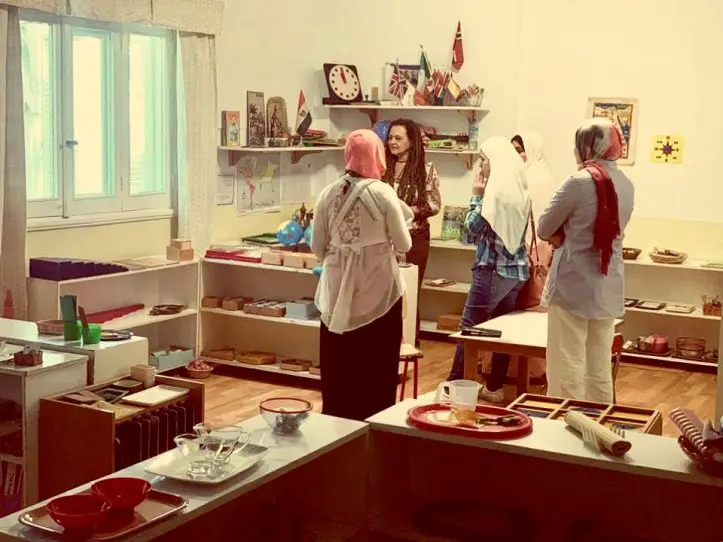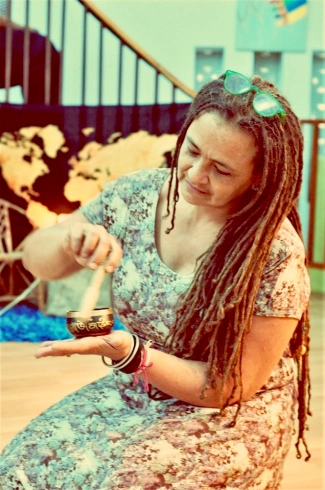Wednesday May 22, 2019 By: Kismat Mokhtar

With great passion to provide and implement the Montessori philosophy and education for underprivileged children, Marie Therese Beshay established a classroom with Montessori Educational Programs International (MEPI) certified teachers at Giza Mother and Child Organization and at St. Mary’s church in Manshiat Nasser.
After receiving her Montessori diploma in 2001, Marie Therese Bishay served as a Montessori classroom directress at the International Montessori Center and mastered her skills under her mentor Mrs. Marguerite Richardt, Co-Founder of Montessori Educational Programs International, MEPI. She is also the lead teacher and project manager at the Child Corner Alwan Wa Awtar Montessori classroom, which started in 2011 as a free tuition Montessori classroom for underserved children and families of Masaken Al Zelzal- Mokattam.
 WOE: In 2001, Montessori education was still a novelty in Egypt. What motivate you to join the class?
WOE: In 2001, Montessori education was still a novelty in Egypt. What motivate you to join the class?
MTB: True, most of the participants were expats when I started the course in 2001. My motivation and inspiration came from three sides, and let me do this backwards, first most intriguing was my first child who had always amazed me since he was born, then getting interested to watching other children and compare my own son’s development. I think what made this all work out was my own personal upbringing. My parents who have a great impact on me. Accepting me as I am, taught me how to celebrate life, exposed me to all kinds of social and cultural diverse experiences, living in Bahrain in the 70’s where I think it’s the safest and most peaceful place on earth, during the first 13 years of my life as a third-culture child, my parents at home were my only safe and peaceful homeland.
WOE: What are the different classes MEC offers?
MTB: We offer many services under the umbrella of early childhood development and wellbeing, child-parent relationship, and family well-being. If not related directly to the Montessori approach, all our services are yet inspired and guided by the renowned philosophy and its well-researched principles and guidelines.
We offer the MEPI Early Childhood teacher education diploma, which we enhance and upgrade every year to include as many rich topics and disciplines as needed, with individual and group student support elements. We include in our diploma course of study several short courses that are open to the public. Introduction to Montessori for infants and toddlers, introduction to special needs, Montessori Arabic language curriculum, self-growth and peace, psychosocial development, arts, classroom management, book discussion circles, among others.
We also recently launched our Outreach & Development program, in which we provide many services in communities across Egypt, including Family Education, Professional Development, Program Evaluation and Support, Child Evaluation, and Caregiver Support (for NGO’s and community-based organizations). We also offer annual international workshops for the Montessori community in Egypt, each year with an international guest presenting on a chosen topic.
 WOE: Who benefits from these services?
WOE: Who benefits from these services?
MTB: Educators, caregivers, parents-to-be, relevant professions and disciplines, preschool managers and staff, civil work community, and many others are able to benefit from our services.
WOE: Tell us more about Alwan Wa Awtar Montessori classroom
MTB: Alwan wa Awtar started at the Zilzal area back in 2011. A free tuition Montessori classroom for under-served children and families of the area. Around the end of 2012, we opened the classroom doors to receive school children after they finish their school day. It was such a success, children were flocking to join the class where they were having a great time with a rich learning experiences, many of the school children were able to express themselves and many others developed better reading and mathematical skills. In 2014 we were obliged to move the classroom out of Zilzal, and we rented a ground floor apartment with a private garden in the middle of Mokattam. Ever since, the classroom started to attract children and parents from different socio-economic backgrounds and physical and mental needs. This year, we have more children from Manshiat Nasser, and special children. In 2016, the classroom moved again to a beautiful villa where we can receive more enrollments and offer more services for both children and parents.
WOE: How many children attend the class? How many have benefited from the class since then?
MTB: Currently we have 45 children in the morning program from different backgrounds and needs. Last summer we served more than 70 children in the Summer School age 7-12. This year we are delivering the Summer School again, and from then, launch an afternoon program that delivers workshops for children and their parents, to help them get engaged with their children, learn together, have fun together, which we hope will create a good basis for their relationship in the home environment. We have already presented an afternoon program for school children 2012/2013 and it proved a lot of success. We have served more than 200 children and their families since 2011.
WOE:What are the criteria to accept children into the class?
MTB: For the best outcomes, we receive children who are no older than 3 years of age, for them to complete a three-year cycle in the Montessori environment.
We also make sure that our registering caregivers are willing to cooperate and become engaged in their children’s development process, to ensure a strong link between home and classroom environment. Moreover, we try to balance between sponsored and paying children. For our work to continue, we need to cover the costs of sponsored children either through donations or paid registrations.
WOE: You mentioned the class includes education for children with special needs.
Do you offer special training classes for teachers in this field? Or a certified MEPI teacher can immediately work with children with special need?
MTB: It is the other way around! Teachers with study and work experience in special needs join our course to become able to work in a Montessori environment. They can then choose to focus their work on children with special needs.Our course only offers an introduction to special needs and skills for teachers working in a classroom with integrated special needs.
The classroom attracts all kinds of children, many of them seem to be disturbed from environment they come from, in general some diagnosed to fit certain disabilities. However, every child is different no matter how serious his physical or mental condition is. This is usually easily detected when any given child is given an opportunity.
We offer basic outlines for our students to help them detect symptoms that may occur with a child, to make them able to work with mild cases when integrated in a Montessori classroom. Since the course attracts many special needs specialists, it organically happened that some of them were able to fade the lines between their experience and study, and the Montessori approach. This not only helps the integrated child but, it also helps other children to accept and cooperate and appreciate.
WOE: Tell us more about the Montessori scholarship diploma MEC offers.
MTB: Each year we receive a selected number of partially-sponsored students who are engaged in community work. We cover part of the costs and the student or their supporting organization cover the rest. Students applying for the scholarship are interviewed for the selection process.
WOE: With more Montessori name attached to schools opening up every day, what qualifies a school to become an MEPI International Accredited School?
MTB: We have three major rules for a qualified classroom, first is a multi-age group ages 3-6, secondly, a full-day Montessori approach for the whole environment not less than 3 hours. Thirdly, all material must be available for the children, in a well-prepared environment prepared by the educated and prepared adult.
WOE: Do you have centers that provide TEP outside of Cairo?
MTB: For the time being, our diploma course is offered annually in Cairo and every other year in Alexandria.
WOE: What is next for Marie Therese and MEC?
MTB: In 2020, we will be presenting the Montessori Infants and Toddlers diploma course in Egypt, which is exciting news for the Egyptian Montessori community.
We hope that we spread knowledge and understanding of the Child in communities across Egypt, through collaborations with dedicated organizations, community centers, and individuals. We want to support delivery of authentic Montessori programs and well-prepared Montessori teachers.
About Marie Therese Bishay
In February 2015, Marie became director of the Montessori Educational Programs International MEPI Teacher Education Program (TEP) in Egypt, as one of the few Early Childhood course directors at Montessori Educational Programs. In July 2015, she was elected for the ambassador seat on the MEPI board.
Recently she established the Montessori Egyptian Center as the gate to expand the TEP across the region, by offering programs to educate and prepare Montessori professionals and establishes Montessori classrooms, especially for the underprivileged,
Marie Therese is also an affiliate with the Montessori Accreditation Council for Teacher Education MACTE located in the USA. She is an on-site verifier visiting Montessori education programs and schools all over the world.
Photos courtesy of Marie Therese Bishay and Montessori Egyptian Center
Check out Montessori Egyptian Center on Facebook or visit their website
***If you liked this article, don’t forget to subscribe to our newsletter and receive our articles by email.
